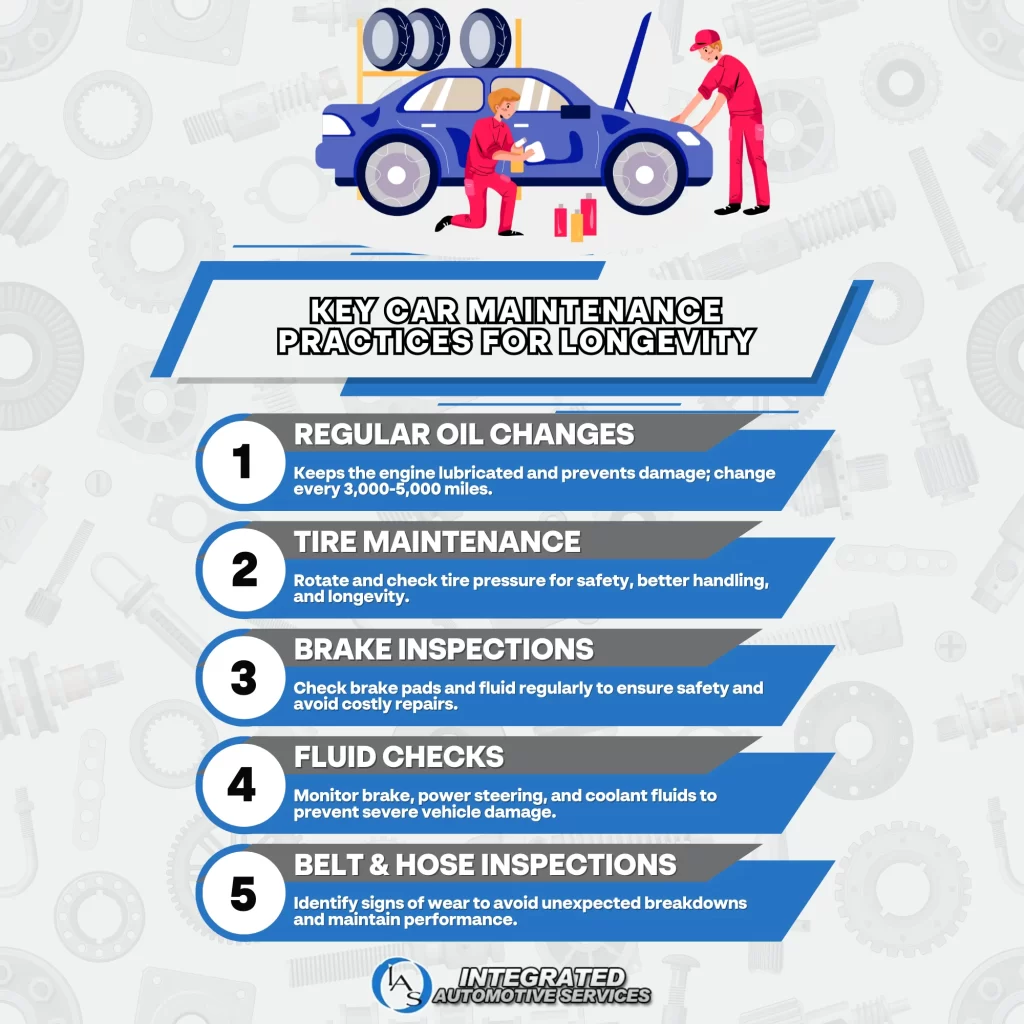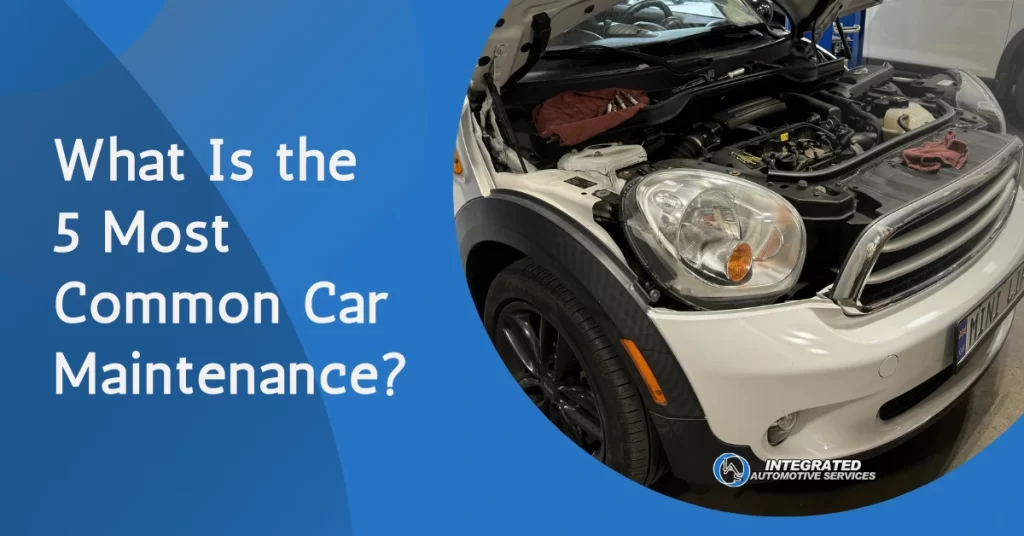The five most frequent car maintenance tasks you’ll encounter include regular oil changes, wiper blade replacements, changing the air filter, abiding by scheduled maintenance specified in your owner’s manual, and swapping out old tires. Reliable engine operation and fuel efficiency depend on timely oil changes. To maintain clear visibility, verify your wiper blades are in good condition. Keep your car’s performance at its peak by replacing the air filter regularly. Regular maintenance inspections help catch minor issues, and new tires enhance vehicle performance and safety. Want to know how these tasks put longevity into your vehicle’s life? Stay tuned.

Key Takeaways
- Regular oil changes are essential to maintain engine efficiency and prevent damage.
- Wiper blades need periodic replacement to ensure clear visibility for safe driving.
- Air filter replacement is necessary to uphold vehicle performance and fuel efficiency.
- Scheduled maintenance, including engine check-ups and brake inspections, is fundamental for vehicle longevity.
- New tires are often needed for improved vehicle performance, safety, and fuel efficiency.
Oil/oil filter changed
Your vehicle’s lifeblood is its oil – a vital player in maintaining engine efficiency. Oil changes are one of the most common car maintenance tasks that you can’t afford to overlook. Regular maintenance, especially oil changes, guarantees the smooth operation of your car’s engine.
Oil lubricates your engine, reducing friction and the resultant wear and tear. Over time, however, the oil deteriorates and picks up dirt and other contaminants, which can cause damage to your engine if not regularly replaced. Therefore, your car’s oil and oil filter require routine changes to keep your engine running at optimum efficiency.
The frequency of oil changes depends on various factors including your vehicle’s make and model, the type of oil you use, and your driving habits. A rule of thumb is to have an oil change every 3,000 to 5,000 miles. However, it’s best to refer to your vehicle’s owner manual for specific guidelines.
Neglecting oil changes can lead to poor engine performance, increased fuel consumption, and even severe engine damage.
Wiper blades replacement
Don’t underestimate the importance of wiper blades in your vehicle’s overall performance. As a part of common car maintenance, wiper blades replacement guarantees clear visibility, which is vital for safe driving.
Over time, wiper blades deteriorate due to exposure to the elements. The rubber can harden, crack, or become misshapen, causing streaks and smears on your windshield. It’s not just an inconvenience – it’s a hazard.
Regular inspection, ideally every six months, is part of common car maintenance services and can help you identify when replacements are needed. You might notice signs of wear such as chattering, streaking, or smearing during use, or physical damage to the rubber blade.
The replacement process isn’t complex, but it requires attention to detail. You’ll need to purchase the correct size for your vehicle – this information can be found in your car’s manual.
Once you’ve got the new blades, it’s a matter of removing the old ones from the arm and attaching the new ones.
Replace air filter
Maintaining ideal vehicle performance involves paying attention to seemingly small details, like regularly replacing the air filter. This task, though often overlooked, is one of the most common car maintenance issues. A clogged or dirty air filter can severely affect your vehicle’s efficiency and overall performance.
Air filters trap dust, dirt, and other particles that can harm your engine. Over time, this debris accumulates, restricting the flow of air. When your engine doesn’t get enough air, it works harder, leading to decreased fuel efficiency and power. It can also lead to other more serious engine problems.
Replacing your air filter is a significant aspect of auto maintenance. It’s generally recommended to change your air filter every 12,000 to 15,000 miles, or at least once a year.
However, if you drive in heavy traffic or dusty conditions, you might need to change it more frequently.
Scheduled maintenance
In the domain of vehicle care, scheduled maintenance stands as an essential routine that guarantees your car’s longevity and peak performance. Adhering to a common car maintenance schedule is crucial, as it guarantees that your vehicle operates at its peak efficiency.
Typically, the most common car maintenance services included in scheduled maintenance are:
- Engine check-ups: Regular inspections to verify the engine is operating efficiently.
- Oil changes: These should be performed every three months or 3000 miles, to verify the engine runs smoothly.
- Brake inspections: Fundamental for safety, these should be checked at each service interval.
It’s important to remember that each vehicle has a unique maintenance schedule, outlined in the owner’s manual. This schedule is designed with your vehicle’s specific needs in mind, and following it will guarantee peak performance and longevity.
In essence, scheduled vehicle maintenance is a proactive approach to car care. It allows you to detect minor issues before they evolve into major problems, saving you time, money, and potential headaches down the line.
New tires
When it comes to enhancing your vehicle’s performance and ensuring safety, investing in new tires is an essential consideration. New tires offer improved traction, better handling, and can considerably increase your vehicle’s fuel efficiency. They’re among the most common maintenance for cars and an important part of automotive maintenance.
Understanding when to replace your tires is key. Look for signs of wear and tear such as uneven tread wear, cracks, or bulges on the sidewall. A penny test can be a simple, yet effective car tip to check your tire’s tread depth. If Lincoln’s head is completely visible, it’s time for new tires.
Selecting the right tires for your car is also important. Consider factors like your driving style, climate, and the type of terrain you frequently drive on. Don’t shy away from asking professionals for advice.
Frequently Asked Questions
How Can I Identify the Need for Brake Repair in My Car?
You can identify brake repair needs by noticing signs like squeaking or grinding noises, a burning smell near the tires, a bouncy ride, or if the brake pedal feels spongy when pressed.
What Are the Signs That My Vehicle Requires a Timing Belt Replacement?
You’ll notice signs your vehicle needs a timing belt replacement: strange engine noises, engine misfires, or oil leakage. If it’s been over 60,000 miles, it’s time to check. Don’t delay, it’s vital.
How Often Should I Take My Car for Diagnostic Checks and Inspections?
You should get your car inspected and diagnosed every six months. Regular checks catch issues you can’t see, ensuring peak performance. Don’t worry, it won’t be time consuming – most inspections are done quickly.
How Does Your Warranty Cover the Services and Products Offered at Your Center?
At our center, you’re covered by a 2-year/24,000-mile warranty on services and products. It’s our commitment to provide reliable, high-quality auto care. Rest assured, we’ll rectify any issues related to our services or products.
Do You Offer Specialized Services for Specific Brands Like Audi and Volkswagen?
Yes, we do! Our certified technicians specialize in servicing brands like Audi and Volkswagen. We use state-of-the-art diagnostics and manufacturer-recommended parts for all repairs and routine maintenance, ensuring your vehicle’s peak performance.
Conclusion
So, you’ve learned about the big five in car maintenance: oil changes, wiper blade replacements, air filter updates, scheduled check-ups, and new tires. Isn’t it reassuring to know what to expect? Now, with your newfound knowledge, you can tackle these common issues head-on. Remember, regular maintenance is the key to a smooth ride. So why not pop the hood and get your hands dirty? After all, your car deserves the best care.



